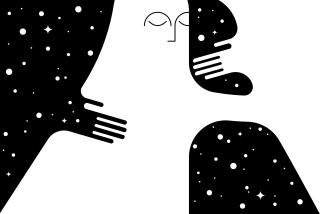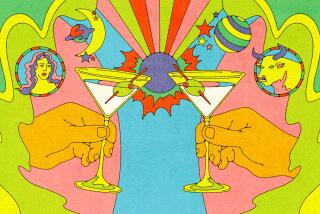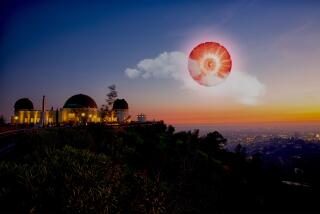Astrology Thrives on the Gullibility Gene
- Share via
The media have greeted the news of the Reagans’ interest in astrology either with amusement or seriousness. One local newscast dutifully presented an astrologer to blather on about why President Reagan gives better press conferences during a full moon or when his Aries is in Aquarius, or whatever.
Certainly the Reagans are in good company. Millions of Americans check their daily horoscope on occasion; I do, too, because I always enjoy noting how vague they are, or simply wrong. But there seem to be as many people who are seriously studying astrology these days as there are students of psychology. (A growing number of astrologer-psychologists combines both occupations.) Drop the subject at a dinner party, and the most sober-sided banker or lawyer will tell you conspiratorially about “a birth chart that fit me exactly” or “a prediction that came true absolutely.”
Of course, people believe in a vast number of religions and philosophies whose premises they take on faith. I would not object to astrology if it were advertised as a matter of “faith.” But it is promoted as a science, describing a set of natural laws that affect our lives. As such, astrology consists of testable assumptions: that it can predict future events in nature and in private lives, that the constellation of stars at your birth affects your personality, and so on.
Geoffrey Dean, a scientist who wrote a two-part investigation of astrological claims for the biweekly Skeptical Inquirer, observes that two questions about astrology are often confused: Does it work? Is it true?
Many systems “work”--that is, make people feel better, help them make sense of a complicated world, reassure them that they are normal--without being true. A hundred years ago phrenology, a system of interpreting personality from bumps on the head, was more popular than astrology is today. It wasn’t true, either, but it “worked” as an effort to explain human behavior.
After major newsworthy events like earthquakes or assassinations, articles in astrology journals immediately appear, showing a clear correspondence between the event and its astral alignment. Unfortunately, these predictions are never accurate in advance; if they were, none of us would need disaster insurance.
The U.S. Geological Survey once invited members of the public--astrologers, psychics, amateur geologists--to send in their predictions of earthquakes. Of the 240 predictions made by 27 astrologers, the accuracy rate was worse than predictions made by random guessing. In another study of 3,011 predictions made in astrology magazines in the 1970s, only 11% turned out to be correct, and many of those were results of shrewd guesses (“East-West tensions will continue”), vagueness (“a tragedy will hit the East this spring”) or inside information (“Starlet A will marry Director B”). Famous astrologers made astounding blunders, predicting reelections for heads of state who were assassinated, and vice versa.
Efforts to document the second key tenet of astrology, that one’s life and character can be assessed from one’s birth chart, have also consistently failed. For example, Geoffrey Dean asked 45 professional astrologers to study 240 birth charts and identify which people were the most introverted, extroverted, emotionally stable or unstable. The astrologers considered the challenge fair and spent nearly 20 hours making their judgments. For comparative purposes, another 45 astrologers simply guessed the traits of each person; this took 20 minutes.
The astrologers who analyzed birth charts did no better than those who were guessing; the astrologers did not agree with each other in any case, and supposedly crucial factors, like the accuracy of the birth date or the astrologers’ experience, did not improve the results.
One reason for astrology’s continuing popularity is that people are just as happy with wrong charts that have nothing to do with them as they are with the “right” ones. In numerous studies in which people have to decide which of two or more charts (their own and others) fitted them best, they have never done better than chance. They say that charts generated randomly “fit me exactly,” that charts made for someone else “fit me exactly,” that all-purpose charts given to thousands of individuals “fit me exactly.” As P. T. Barnum said, “Always have a little something for everybody.” Astrological descriptions do.
Dean calls astrology “psychological chewing gum, satisfying but ultimately without real substance.” If astrology is used as entertainment or religion, he concludes, there is no problem with it. The mind is designed to try to make sense out of experience, to create a coherent story, and astrology does that nicely. Scientist Richard Furnald Smith once said: “Given the extraordinary ability of the human mind to make sense out of things, it is natural occasionally to make sense out of things that have no sense at all.”
But if astrology is advertised as the truth, then consumers are being defrauded and possibly harmed. Powerless people are not served by a philosophy that turns their explanations of destiny to the stars. And if powerful people with ultimate responsibility for the laws and institutions of the nation pass that buck to the stars, the rest of us are in big trouble.






